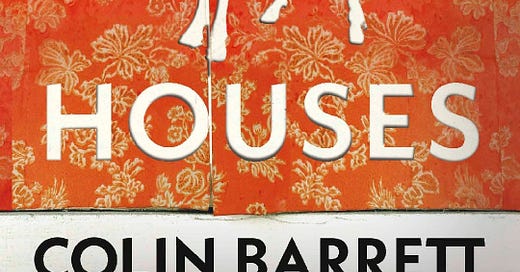Book Review: Wild Houses by Colin Barrett
The Booker 2024 longlisted novel about 'wild houses' that we carry inside us.
"But you can't undo it, can you? You can't unsay it, unthink it. You can only watch the ripples spreading out from you, a widening circle of disturbance that you can't stop."
"Wild Houses" is the acclaimed debut novel by the Irish writer Colin Barrett. It is longlisted for the Booker Prize of 2024. I received a review copy from the publisher, Grove Atlantic, through Netgalley. The novel, set in a quaint Irish small town, is a reflective exploration of the quest for identity and redemption set against a dreary existence amidst addiction, crime, and mental issues. Loneliness is a defining trait of all the characters in the novel, and what separates them is their efforts to either escape or embrace it. The novel contrasts the familiarity and closed nature of a small town with its characters' efforts to transcend to survive.
We encounter the phrase 'wild house' for the first time in the novel when an old woman describes her drug-dealing son's house. She calls it so because of his milieu and who she imagines to congregate in that place. But we soon realize that the said house is no more a 'wild house' and we have already encountered another one in our opening chapter. It is in this wild house inhabited by the passive Dev that much of the drama in the novel unfolds when a kidnapped young man is brought by two goons for safekeeping till his elder brother, the aforementioned ex-drug dealer, coughs up the money that he owes.
The plot, which is narrated in three parts, primarily concerns a kidnapping that has gone awry and how everyone affected by it is forced to act against their nature while discovering new facets about themselves. The story unfolds from the perspective of two characters, the loner Dev, who owns the house to which the Ferdia brothers bring the kidnapped Doll English, and the resourceful Nicky, the young girlfriend of Doll, who is forced to broach unfamiliar territories to free him. The author contrasts the development of these two characters.
While Dev, who is a passive person, becomes more inclined to shrink inside his shell as the story progresses, Nicky gradually finds it easy to empathize with and embrace others. All the other characters seem to be placed in between these two extremes. It is the character study that elevates the novel from a straightforward crime story. The writer uses precise and evocative prose that brings together both the narrow small-town sensibilities and the complex psychological profiles of the characters. Through his detached but empathetic writing, he presents the onus of passing judgment on the actions and behaviors of his characters to his readers.
While we find more than one literal 'wild house' in the book, we also realize that each of the characters' minds are metaphorical wild houses, where complex and even conflicting emotions interact with each other. I haven't come across a better title in recent times that precisely captures the essence of its subject.




